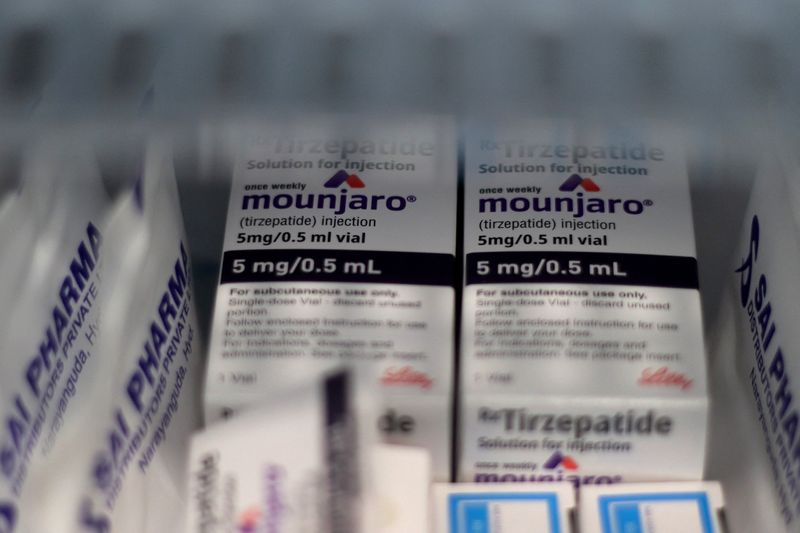Eli Lilly’s strong quarter undercut by CVS move to drop Zepbound coverage

By Bhanvi Satija and Patrick Wingrove
(Reuters) -Eli Lilly on Thursday posted better-than-expected quarterly results, but CVS Health (NYSE:CVS)’s decision to drop the company’s obesity drug Zepbound from the list of medicines it covers for reimbursement dragged shares down nearly 7%.
CVS said its pharmacy benefit management unit, which is the largest in the U.S., would drop Zepbound coverage from July 1, but keep reimbursing for rival GLP-1 weight-loss drug Wegovy after negotiating a more favorable price from Danish drugmaker Novo Nordisk (NYSE:NVO).
Pharmacy benefit managers negotiate volume discounts and fees with drug manufacturers on behalf of employers and health plans, and create lists of medications that are covered by insurance. Prescriptions can be drastically reduced if these middlemen decide not to cover a drug.
The next two largest U.S. PBMs - UnitedHealth Group (NYSE:UNH)’s OptumRx and Cigna (NYSE:CI)’s Express Scripts - did not immediately respond to queries about whether they were considering similar moves.
The success of Lilly’s popular weight-loss and diabetes treatments has made the Indianapolis-based drugmaker the world’s most valuable healthcare company, with a market value of more than $800 billion.
Two Lilly investors said CVS’ coverage decision will heat up the pricing competition between Novo and Lilly. But they were not immediately worried about impact to sales as patients and doctors seem to prefer Zepbound, they said.
"There’s always the risk of a price competition when your competitor Novo Nordisk is frankly not doing enough with its pipeline. So they may try to get a bit too aggressive on pricing just to maintain market share," said Kevin Gade, portfolio manager at Bahl & Gaynor, which owns Lilly shares.
3rd party Ad. Not an offer or recommendation by Investing.com. See disclosure here or remove ads.Lilly said lower prices for Zepbound trimmed revenue in the quarter, but that demand remained strong. Sales of the drug came in at $2.31 billion for the first quarter, slightly below analysts’ expectations of $2.33 billion, according to LSEG data.
Lilly in February cut the price for vials of Zepbound by $50 or more and expanded the range of doses it sold online to address competition from compounding pharmacies and Novo. It now offers the two lowest doses of Zepbound for $349 and $499 for a month’s supply.
OVERTAKING WEGOVY
Weekly U.S. prescriptions of Wegovy have plateaued since mid-February, according to IQVIA data provided by analysts. Zepbound recorded nearly 339,000 prescriptions for the week ending April 18, overtaking Novo’s obesity drug by more than 127,000.
Lilly said it had captured about 53.3% of the U.S. market share. IQVIA data suggested Lilly’s current share was closer to 62%.
Leerink analyst David Risinger said CVS’ coverage decision will "hurt Zepbound’s growth momentum," although he noted that it has been shown to be a more effective drug than Wegovy.
"We think that (Lilly) will still maintain leading market share, but clearly the CVS Caremark move will slow its market share trends starting in July," said Risinger, adding that the drugmaker will have to address how it plans to respond.
"I would assume that Lilly will fortify its relationships with other major PBMs, and will focus its growth efforts globally to continue to expand the adoption of tirzepatide ex-U.S.," he added, referring to the chemical name for both Zepbound and Mounjaro.
3rd party Ad. Not an offer or recommendation by Investing.com. See disclosure here or remove ads.Sales of diabetes drug Mounjaro were $3.84 billion, exceeding analysts’ estimates of $3.80 billion. Mounjaro is also the brand name used for weight loss outside the U.S.
Lilly cut its full-year adjusted profit forecast to between $20.78 and $22.28 per share, from its previous view of $22.50 to $24.00 per share, citing deal charges.
The drugmaker said its forecast is based on "the existing tariff and trade environment," and did not quantify any impact from potential tariffs.
Lilly, like Novartis (SIX:NOVN) and Johnson & Johnson (NYSE:JNJ), has committed to increasing its U.S. manufacturing presence, pledging to spend at least $27 billion as the threat of tariffs from U.S. President Donald Trump looms over the sector.
On an adjusted basis, Lilly earned $3.34 per share for the quarter, topping analysts’ estimates by 32 cents.
Total revenue for the period was $12.73 billion, above Wall Street expectations of $12.67 billion.
Should you invest $2,000 in LLY right now?Before you buy stock in LLY, consider this: ProPicks AI are 6 easy-to-follow model portfolios created by Investing.com for building wealth by identifying winning stocks and letting them run. Over 150,000 paying members trust ProPicks to find new stocks to buy – driven by AI. The ProPicks AI algorithm has just identified the best stocks for investors to buy now. The stocks that made the cut could produce enormous returns in the coming years. Is LLY one of them?
Reveal Undervalued Stocks Now